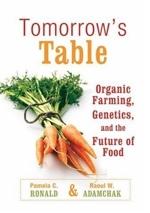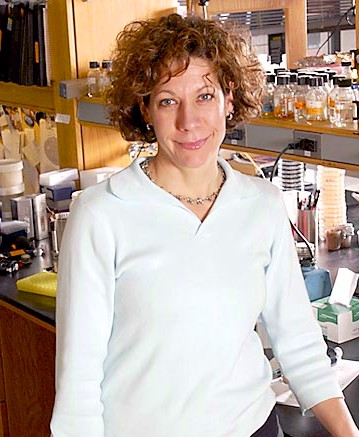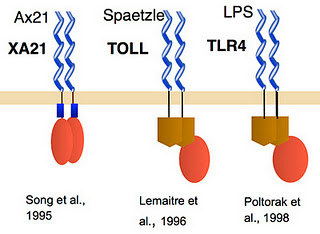Profile
 Pamela Ronald is Professor of Plant Pathology at the University of
California, Davis, where she studies the role that genes play in a
plant's response to its environment. Her laboratory has genetically
engineered rice for resistance to diseases and flooding,
both of which are serious problems of rice crops in Asia and Africa. Ronald is co-author with her husband, an organic farmer, of "Tomorrow's Table: Organic Farming, Genetic and the Future of Food".
Pamela Ronald is Professor of Plant Pathology at the University of
California, Davis, where she studies the role that genes play in a
plant's response to its environment. Her laboratory has genetically
engineered rice for resistance to diseases and flooding,
both of which are serious problems of rice crops in Asia and Africa. Ronald is co-author with her husband, an organic farmer, of "Tomorrow's Table: Organic Farming, Genetic and the Future of Food".
Ronald interviews, lectures and profiles
Longer Bio for Ronald

Search
Recent Posts
Recent Comments
Archives
Blogroll
Other Information

"[Tomorrow's Table" is a fantastic piece of work.
I totally recommend it whether you are pro GMO or anti-GMO." "This is an important book... I agree with the authors that we will need the best ideas from "organic" thinkers and from scientists – including genetic engineers – to feed the world and help the poorest...I certainly recommend this book"--
Bill Gates
"Here's a persuasive case that, far from contradictory, the merging of genetic engineering and organic farming offers our best shot at truly sustainable agriculture"--
Stewart Brand, creator of the Whole Earth Catalog
We found the book insightful and well-documented." --
Organic Gardening Magazine
"Whether you ultimately agree with it or not, Tomorrow's Table bring a fresh approach to the debate over transgenic crops."--
Michael Pollan, author of
In Defense of Food and
The Omnivore's Dilemma
"The noteworthy aspect of the book is the way they then marry their separate fields to argue logically for the use of GM technologies to improve organic agriculture." --
Science magazine
"Brilliant... the best book I have ever read about the ways in which genetically engineered and organic food relate to each other and society." --
Michael Specter, Staff writer for
The New Yorker
"A unique, personal perspective ... Highly recommended." -- Peter H. Raven, President,
Missouri Botanical Garden
"A tale of the passions of an organic farmer and a plant genetic scientis...a source of inspiration." -- Sir Gordon Conway KCMG FRS, Professor of International Development,
Centre for Environmental Policy, Imperial College, London, and past President of the
Rockefeller Foundation
"Simply one of the best scientific presentations of organic agriculture I have read in that it is soundly grounded in the literature and does not over-reach, while remaining staunchly and reasonably pro-organic." -- Phil Stewart
"This wildly eccentric book juxtaposes deep scientific analysis of genetically engineered agriculture with recipes for such homey kitchen staples as cornbread and chocolate chip cookies." -- Booklist
Tomorrow's Table in the classroom at Oregon State University:
"I really enjoyed the book. It did a great job of keeping everything in perspective. Use again!"
"Use again! A great resource and easy to understand"
"The textbook was great. It had a story line to it. It was easy to remember."
"Tomorrow´s Table, una búsqueda de la verdad sobre la agricultura orgánica y la modificación genética" --
Antama Fundacion

 Article, The New Organic in The Boston Globe
Article, The New Organic in The Boston Globe
 Article, Making Rice Disease-Resistant in Scientific American
Article, Making Rice Disease-Resistant in Scientific American
 Ronald speaking schedule
Ronald speaking schedule
Ronald publications
Read Reviews of Tomorrow's Table
Interviews, lectures and profiles
Read about submergence tolerant rice
Learn about pattern recogniton receptors and disease resistant rice
Learn about the Genetic Resources Recognition Fund
Learn about Biofuels
April 26, 2012
Category: GMO • Genetically engineered crops • agricultual policy • biofortified • genetics and society • organic farming
A paper in this week's issue of Nature and a commentary on Revkin's DotEarth blog reinforces the argument that a hybrid path in agriculture -- incorporating both conventional and organic production practices -- gives the best chance of feeding some 9 billion people by midcentury in an ecologically-based manner.
The thoughtful and comprehensive study compares yields in organic and conventional systems and addresses the criticisms of an earlier study by Badgley et al (for problems with the earlier study, see the supplementary discussion in Seufert et al).
The organic agriculture movement has been important because it has brought consumer attention to the overuse of some pesticides and fertilizers. It has also raised awareness of the need to foster soil fertility. But organic farming practices are just part of a future sustainable agriculture. Just like conventional farmers, organic farmers face pests that are difficult to control or environmental stresses that can affect yield. For example, strawberries are highly susceptible to soil born diseases. Currently both conventional and organic growers purchase clonally propagated seedlings that were fumigated with methyl bromide, an insecticide known to increase the risk of prostrate cancer. Unlike conventional growers, organic growers do not use methyl bromide in the field. To reduce infection, they rotate strawberries with another crop, such as broccoli (a less valuable crop). The trade off to the grower is that yields of organic strawberries are lower. And the consumer pays higher prices for organic strawberries. Clearly, we need better methods to control strawberry diseases that will benefit both conventional and organic production.
Although the Seufert et al study shows that yields on organic farms are generally lower than most conventional farms (with important exceptions that the authors discuss), this yield differential will change with time. On the one hand, as Seufert et al point out, improvements in management techniques that address factors limiting yields in organic systems will enhance the yield of organic systems. On the other hand, because organic farmers are prohibited from using genetically engineered crops, they will not be able to reap the benefits of new crop varieties that assimilate nitrogen more efficiently, that are resistant to disease or tolerant of drought. For example, genetically engineered papaya in Hawaii yields 20x more than organic papaya (note, it appears that papaya was not included in the Suefert et al study). This is because there is no organic method to control a devastating viral disease that has infected papaya. At the other extreme, Suefert et al show that yields of other organic fruit and oilseed crops show very little yield differences with conventional crops. Clearly it is impossible to say which farming system is "better". Each crop and faming system must be evaluated on a case by case basis.
The study points to the need to drop the ideologically charged "organic vs. conventional" debate and instead focus on what matters: the need to reduce the use of the most toxic insecticides, produce food more efficiently using less land and water and to enhance food security in the poorest regions of the world.
Posted by Pamela Ronald at 5:05 PM • 15 Comments • 0 TrackBacks
April 22, 2012
Category: Ronald research • genetics and society • the scentific life • women in science
I was so pleased to have a chance to take part in the Women in Science Symposium at Cornell April 2-3.
Thanks to the Cornell faculty and students that put together this wonderful event. For those that could not attend, read the graduate student interviews with the speakers here.
Dr. Mary Power is director of the Angelo Coast Reserve, leader in scientific societies, mentor to many successful students, and as an influential figure in several environmental policy debates.
Dr. Sharon Long is member of National Academy of Sciences and served as science advisor to President Obama during his campaign.
Dr. Nicole Dubilier currently leads the Symbiosis Group at the Max Planck Institute for Marine Microbiology in Bremen, Germany, where she mentors nearly a dozen PhD students and juggles several projects, yet still manages to balance all this with a family at home.
Dr. Mary Berenbaum's lab studies the co-evolution of insects and their host plants. Her Berenbaum's awards include a Guggenheim Fellowship; US National Academy of Sciences membership; and for her ongoing commitment to science communication, the AAAS Public Understanding of Science and Technology Award.
Princeton's Jeanne Altmann's research on baboons represents a stellar contribution to the field of behavioral ecology.
Mary-Claire King's work unraveled the genetic basis of breast cancer and Nobel Laureate Linda Buck research revealed how mammals distinguish the scent of lemon from that of... scat
Posted by Pamela Ronald at 10:30 PM • 0 Comments • 0 TrackBacks
April 1, 2012
Category: biodiversity • the scentific life • women in science
I am so looking forward to the talks tomorrow.
Linda Buck! Sharon Long! Mary-Claire King! and more...
Frontiers in the Life Sciences: a Symposium Celebrating Excellence
Posted by Pamela Ronald at 9:37 PM • 3 Comments • 0 TrackBacks
March 26, 2012
Category: biofortified • genetics and society • the scentific life • women in science
Bacteria can talk. Yes. Talk. These unicellular, primitive creatures have their own language. They secret chemical words to their environment, where their neighbors can listen, comprehend and react to those messages.
This bacterial communication is called quorum sensing (QS).
Although the first discoveries in the field of bacterial communication where made more than 40 years ago in the marine bacterium Vibrio fisheri (1), they simply did not have the quorum to be heard. Until Bonnie Bassler came along.

Read on »
Posted by Pamela Ronald at 3:43 PM • 3 Comments • 0 TrackBacks
March 10, 2012
Category: biofortified • genetics and society • organic farming • sustainability
The New Earth Archive is a resource network of powerful, inspiring books on climate change, sustainability, social justice, and human nature.The students ask you to vote for up to 15 of your favorite books.
So pleased, Tomorrow's Table made the list!
http://www.surveygizmo.com/s3/808430/neweartharchive-ballot
Whoie Earth Discipline, by Stewart Brand is also on the list and so are many other great books.
Please spread the word. Thanks for your support.
The New Earth Archive was developed by students at the New Jersey Institute of Technology, and supported by Paul Hawken and other leading public environmental figures.
Posted by Pamela Ronald at 7:03 PM • 3 Comments • 0 TrackBacks
January 31, 2012
Category: biofortified • innate immunity • the scentific life
 Applause for Plant Physiologist Helen Stafford who bequeathed an astonishing $8M to Reed College in her will. As a woman scientist in the 1950s, Stafford was ineligible for many jobs. Reed College, not deterred by her sex, offered her a position. She went on to establish a successful career and inspired many young scientists. Here is a short story of how she influenced my career.
Applause for Plant Physiologist Helen Stafford who bequeathed an astonishing $8M to Reed College in her will. As a woman scientist in the 1950s, Stafford was ineligible for many jobs. Reed College, not deterred by her sex, offered her a position. She went on to establish a successful career and inspired many young scientists. Here is a short story of how she influenced my career.
The windowless room, dank an dark, was not an obvious place for inspiration. I took notes, wondering if I would be able to glean anything meaningful from Professor Helen Stafford's (1922-2011) meandering lecture. I was skeptical. After all, this was the same teacher who, annoyed with our choice of vegetarianism, had told us that "plants have feelings, too".
But what I learned that day, 33 years ago, would trigger a grand curiosity about the natural world and draw me into the greatest scientific puzzle of my career.
Helen informed us that human language is not the only way that species communicate. Plants form intimate associations with fungi and bacteria, which allow them to thrive in stressful environments. Establishment and maintenance of the relationship depends on the passing and receiving of coded information between partners. She also told us that plants can only defend themselves against microbes that they can sense.
This interspecies communication is not restricted to plants and microbes. The human intestine is home to diverse bacteria, allowing us to harvest nutrients that would otherwise be inaccessible. The human immunodeficiency virus chooses for its target only those of us that carry a specific receptor, decorated in a particular way.
All these interactions dramatically affect human health and farm productivity.
I was hooked.
Read on »
Posted by Pamela Ronald at 4:06 PM • 2 Comments • 0 TrackBacks
January 27, 2012
Category: biofortified • innate immunity
"Nothing more fun than making discoveries in nature and then seeing them used for the public good "
Listen to the NPR interview with enthusiastic Professor Emeritus Murray Gardener.
He describes recent UCDavis symposium with 2011 Nobel Laureates Bruce Beutler and Jules Hoffman
Posted by Pamela Ronald at 1:09 PM • 1 Comments • 0 TrackBacks
January 22, 2012
Category: biofortified • innate immunity • the scentific life
The University of California, Davis, will host two Nobel laureates for a symposium this month about the shared characteristics of plants, flies and people in terms of how they fight infections.
"Evolution of Common Molecular Pathways Underlying Innate Immunity" will feature the 2011 Nobel Laureates in Physiology or Medicine, Jules Hoffmann of the University of Strasbourg, France, and Bruce Beutler of the University of Texas Southwestern Medical Center, Dallas. Luke O'Neill, professor of biochemistry and immunology at Trinity College, Dublin and I will also give lectures.
The symposium is scheduled from 1 to 5 p.m. Wednesday, Jan. 25, in the UC Davis Conference Center. Admission is free, with preregistration required online.
It will be the first symposium at UC Davis to highlight the remarkable similarities between the plant and animal immune systems. The discovery of a role for fly Toll and mouse TLR4 in immunity provided a structural link between receptors utilized by animals and those used by plants (eg. Rice XA21, flax L6 and tobacco N) to detect infection.

[Bruce and I share more than an interest in science; my father (Robert Rosenthal) and Bruce's father (Ernst Beutler) were young cousins in Berlin in the 1920 and early 1930s. Their families fled the Nazi's and reunited in the US after the war. Listen to Bruce discuss XA21/Ax21 and our shared family history during his Nobel lecture last month (starts at 40:45)]
More on the Nobel discoveries, the history of plant and animal immunity and the XA21 cypher-breaking detection system can be found on my recent blog posts here and here.
Posted by Pamela Ronald at 12:22 PM • 1 Comments • 0 TrackBacks
January 16, 2012
Category: agricultual policy • biofortified
Another vigilante for truth. Lithodid man exposes Jeffrey Smith #antiGMO fraud in this entertaining video. Well done Lithodid.
Posted by Pamela Ronald at 12:58 PM • 1 Comments • 0 TrackBacks

 Pamela Ronald is Professor of Plant Pathology at the
Pamela Ronald is Professor of Plant Pathology at the 




 Applause for
Applause for 
